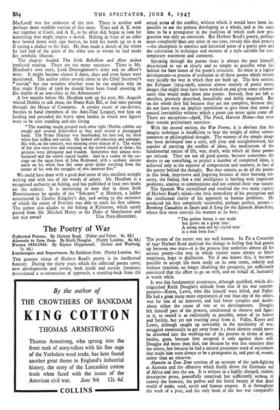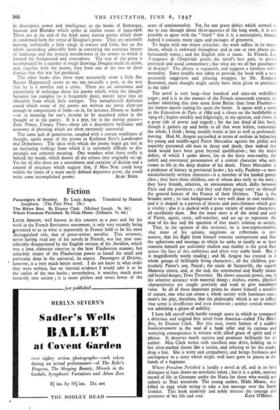The Poetry of War
7s. 6d.) Landscapes and Departures. By Kathleen Nott. (Poetry London. 6s.)
THE greatest virtue of Herbrrt Read's poetry is its intellectual honesty. During the thirty years which his collected poems cover, new developments and events, both inside and outside literature, necessitated a re-orientation of approach, a standing-back from the
actual arena of the conflict, without which it would have been im- possible to see the pattern developing as a whole, and at the same time to be a protagonist in the tradition of which each new pro- gression was only an extension. But Herbert Read's poetry, perhaps more completely than any other of our time, reveals this dual process —the absorption in emotion and historical sense of a poetic past and the cultivation in technique and manner of a style suitable for con- temporary statement and comment.
Speaking through the poems there is always the poet himself, determined to say as clearly and as simply as possible what lie; behind the bare bones of the poem's structure. So there is a logical development—a process of evolution in all these poems which reveals very lucidly the way in which they are built up. The first section, the Eclogues (1914-1918), consists almost entirely of poetic notes, images that might later have been worked on and given some coherent unity that would make them into poems. Instead, they are left as sketches, precisely described, beautifully and deftly imagined. But on the whole they fail because they are not complete, because they do not have even an implicit symbolism to give them that sense of natural inevitability without which a poem can never quite come off. There are exceptions—April, The Pond, Harvest Home—but even they remain preliminary exercises.
With the second section, the War Poems, it is obvious that the imagist technique is insufficient to bear the weight of either serious comment or philosophical thought. The manner of the simple image has been developed into a style, still clear and straightforward, but capable of carrying the conflict of ideas, the meditations of the fundamental nature of life, war, death, with which all these poems are infused. They are not all good poems, because sometimes the desire to say something, to project a number of completed ideas, is achieved only at the expense of compression and tautness, in fact of the poetry behind the thought. But they remain, as do all the poems in this book, impressive and lingering because of their burning sin- cerity, the feeling that a real intelligence is battling with important problems, anxious to communicate and not conceal their true nature.
The Spanish War crystallised and resolved the two main aspects of Herbert Read's talent—the lyric immediacy of his perception and the intellectual clarity of his approach to human problems. He produced his first completely successful, perhaps perfect, poems.— Bombing Casualties in Spain and A Song for the Spanish Anarchists, whose first verse conveys his manner at its best:
"The golden lemon is not made but grows on a green tree: A strong man and his crystal eyes is a man born free."
The poems of the recent war are well known. In To a Conscript of 1940 Herbert Read analysed the change in feeling that had grown up between two wars—it is the process that underlies almost all his serious poetry—the way in which victory turns always to bitter emptiness, hope to disillusion. Yet if one knows this, it becomes
possible to accept life more easily on its own terms, soberly and without cynicism no longer idealising the prospects yet sufficiently convinced that the effort to go on with, and on behalf of, humanity is worth while.
It was this fundamental acceptance' although qualified, which dis- tinguished Keith Douglas's attitude from that of his war contem- poraries—Keyes, Lewis, who like himself were killed, and Fuller. He had a great many more experiences of war than any of the others, was far less of an introvert, and had fewer scruples and doubts about either the cause of war or its developments. Douglas felt himself part of the process, condemned to observe and figure in it, to record it as realistically as possible, aware of its horror and futility, but yet not reacting away from it. ' Fuller, Keyes and Lewis, although caught up inevitably in the machinery of war, struggled emotionally to get away from it ; their identity could never be absorbed into the working-out of the process in terms of men, battles, guns, because they accepted it only against their will. Douglas did more than that, not because he was less sensitive than the others, but because he had a natural passionate need of excitement that made him want always to be a protagonist in, and part of, events, rather than an observer.
Alamein to Zem Zem consists of an account of the tank-fighting at Alamein and the offensive which finally drove the Germans out of Africa and into the sea. It is written in a highly charged, violent, descriptive prose, powerfully contrived but sufficiently serious to convey the humour, the pathos and the literal beauty of that dead world of tanks, sand, scrub and human corpses. It is throughout the work of a poet, and the only book of the late war comparable in descriptive power and intelligence to the books of Remarque, Sassoon and Blunden which spoke in similar terms of 1914-1918. There are at the end of the book some sixteen poems which show in condensed form the virtue of Douglas's prose. They are extremely moving, technically a little rOugh in texture and form, but on the whole succeeding admirably both in conveying the sensuous beauty of landscape and the ironical macabreness of the events to which it formed the background and atmosphere. The text of the prose is accompanied by a number of rough drawings Douglas made in action, and, together with the poems, they form one of the two or three classics that this war has produced.
The other books after these must necessarily seem a little flat. Rayner Heppenstall seems to me not naturally a poet, in the way that he is a novelist and a critic. There are an uneasiness and uncertainty of technique about his poems which, when the thought becomes too complex (as it frequently does), merely lapse into an obscurity from which little emerges. The metaphysical dialectics round which many of the poems are written are never clear-cut enough in compression of form—as in, for instance, Donne or Auden —or in. meaning for one's interest to be sustained either in the thought or in the poetry. It is a pity, for in the shorter pieces— Zulu Prince, Uneasy Time—there are a descriptive brilliance and economy of phrasing which are often extremely successful. The same lack of penetration, coupled Skith a certain woolliness of thought, spoils many of the poems in Kathleen Nott's Landscapes and Departures. The ideas with which the poems begin get lost in an increasing verbiage from which it is extremely difficult to dis- entangle any concrete meaning. One wonders what there really is behind the words, which drown all the echoes they originally set up. Yet for all this there are a smoothness and certainty of diction and a control of structure which suggest that, if Miss Nott could keep within the limits of a more easily defined departure point, she could write some accomplished poems. ALAN Ross.



































 Previous page
Previous page